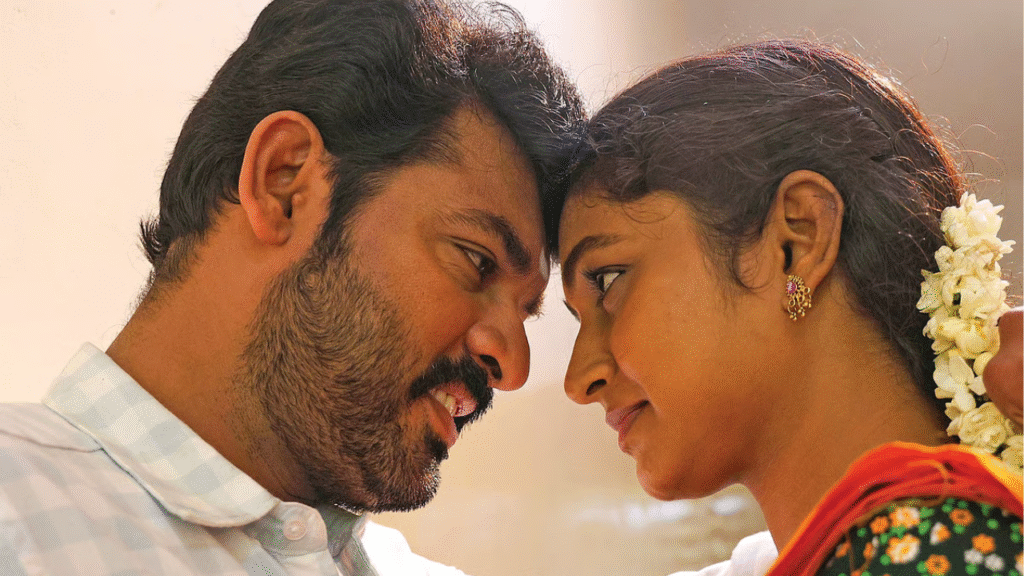Language: Tamil
Genre: Supernatural Drama, Mystery, Rural Conflict
Age Rating: U/A
Released in Theatres: June 5, 2025
In this Paramasivan Fathima movie review, we explore a film that attempts to merge interfaith tensions, village politics, and ghostly vengeance into a single narrative. Directed by Esakki Karvannan, who also stars as the investigating police officer, the film begins with promise but quickly unravels into a muddled mix of social commentary and supernatural theatrics.
Plot: When the Past Haunts the Present—Literally
Set in two neighboring villages—Subramaniapuram (predominantly Hindu) and Yokopuram (largely Christian)—the story kicks off with a series of murders on wedding nights that stir up age-old animosities. As suspicion and fear spread through both communities, an underwhelming police investigation ensues, led by Karvannan himself, aiming for dark comedy but often missing the mark.
At the heart of the story lies a forbidden love story. Paramasivan (Vimal) and Fathima (Chaya Devi) are childhood sweethearts separated by religious conversion and the tragic death of Fathima’s father. His dying wish to be buried as a Hindu triggers a bitter burial dispute, ultimately leading to both Paramasivan and Fathima being killed.
Years later, their spirits return seeking justice—not just for their own deaths, but for the communal divisions that destroyed their love and lives.
Also Read: The Verdict (2025) Movie Review: A Game of Strategy, Secrets, and Stunning Performances
Performances: Emotionally Stuck Between Real and Unreal
Vimal delivers a committed performance as Paramasivan, trying to balance a role that demands both emotional gravity and ghostly rage. Chaya Devi as Fathima brings dignity to a character caught in the crosshairs of identity, duty, and trauma. However, the film’s confused tone prevents their chemistry from fully resonating.
MS Bhaskar plays a Christian pastor whose character unfortunately leans into outdated stereotypes, reducing a potentially nuanced figure into a walking trope.
Direction and Writing: Heavy-Handed and Inconsistent
Esakki Karvannan wears multiple hats—as director, writer, and actor—but perhaps spreads himself too thin. The film tries to juggle satire, social critique, and supernatural horror, but fails to maintain a consistent tone. What could have been a powerful exploration of religious division and reconciliation ends up as an overextended fable.
The first half, loaded with attempted humor and slapstick investigation scenes, feels disjointed. The second half shifts abruptly into spiritual vengeance and folklore horror, making the tonal switch jarring.
Cinematography and Sound: Loud but Lacking in Atmosphere
Visually, the film does a passable job of capturing rural landscapes and religious settings. However, the sound design overcompensates with jarring effects and background scores that often overwhelm rather than enhance.
Instead of building quiet dread or spiritual unease, the audio barrage distracts from the emotional core of the film. It’s less eerie and more exhausting.
Check Out Thug Life Movie Review: Mani Ratnam’s Gritty Gangster Epic Hits Hard but Fumbles Late
What Works
✅ A brave attempt to tackle religious tensions through a unique supernatural lens
✅ Vimal and Chaya Devi’s earnest performances
✅ Some poignant themes around love, loss, and justice
Where It Falls Short
- Poor tonal control—confused between satire, horror, and drama
- Repetitive plot points and underdeveloped subplots
- Flashback sequences feel overly dramatic and stretched
Cultural Lens: A Reflection That Misses Focus
Paramasivan Fathima aims to critique societal divisions, religious rigidity, and unresolved trauma—worthy topics, especially in contemporary India. However, its execution undercuts the message. Instead of offering new insight or layered characters, it simplifies beliefs into binary positions, robbing the narrative of its emotional complexity.
Check Out Rajaputhiran Movie Review – A Throwback Rural Drama Rooted in Familiar Emotions
Final Verdict: ⭐️⭐️⭐️½ (3.5/5 Stars)
Paramasivan Fathima is an ambitious film that reaches for depth but stumbles in its delivery. While the story holds potential, its inconsistencies in tone, character development, and narrative flow keep it from rising to the occasion. Still, the underlying theme of interfaith tragedy and longing for justice gives it enough emotional weight to leave an impression.
Should You Watch It?
If you enjoy experimental cinema that blends folklore with social commentary—and are willing to overlook some storytelling flaws—Paramasivan Fathima might be worth a one-time watch. Just don’t expect a polished product or a cohesive genre experience.

